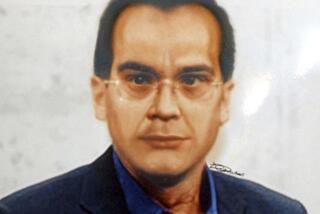Italy’s spy chief ousted over CIA kidnap case
ROME — Italian Prime Minister Romano Prodi on Monday dismissed the government’s top intelligence chief, a veteran spymaster under investigation for his role in the alleged CIA abduction of a radical Egyptian cleric from Milan three years ago.
With his removal, intelligence chief Nicolo Pollari became the highest-level Italian official to lose his job over the case, adding to suspicions that the previous government collaborated more closely with the CIA than has been acknowledged.
Pollari’s No. 2 was arrested over the summer, and Italian prosecutors are seeking the arrest of 26 Americans, mostly CIA operatives. The Americans are accused of hunting down and seizing the cleric and then transporting him secretly to Egypt, where he says he was tortured.
Pollari repeatedly denied having had advance knowledge of the abduction. But testimony from colleagues and evidence gleaned from police wiretaps suggest otherwise.
Pollari, who led the military intelligence agency known as SISMI, may face indictment. Parliament’s intelligence committee was to begin debating his fate today. Portions of the committee’s draft report, released last week, accuse Pollari of lying to authorities and covering up SISMI’s involvement in the abduction case.
Cleric Hassan Osama Nasr, also known as Abu Omar, was seized in February 2003 as he walked to a mosque in Milan. His was one of dozens of so-called extraordinary renditions the U.S. government conducted as part of its controversial attempt to pursue terrorism suspects.
Many of the suspects ended up in third countries known to practice torture or in clandestine prisons run by the CIA.
The CIA trail in the Abu Omar case has long been established: Italian prosecutors say the CIA operatives left behind credit card receipts and passport photocopies, and chatted openly on their cellphones, all of which became evidence compiled by the prosecutors.
But the exact role of Italian authorities remained less clear. The then-government of Prime Minister Silvio Berlusconi, a right-wing ally of the Bush administration, denied knowledge of the abduction, but intelligence experts and much of the Italian public considered that unlikely on the eve of the war in Iraq.
Foremost, it seemed unimaginable that CIA operatives would have acted with such apparent disregard for secrecy if they hadn’t been assured of official permission.
All of the Americans named by Italian prosecutors, including the former CIA station chiefs in Rome and Milan, are no longer in Italy, and their arrests seem unlikely.
Prodi, the center-left prime minister elected in April, replaced Pollari with a senior naval commander and also named new chiefs for two other key intelligence agencies, essentially a clean sweep of the leadership of a scandal-plagued spy network.
In addition to the Abu Omar case, Pollari’s name was linked to a plot to produce, and leak to U.S. agents, documents purporting to show that Iraq was attempting to buy weapons-grade uranium from Niger. The claim, which proved false, was used by the Bush administration to help justify launching the war against Iraq.
Pollari and SISMI also were suspected of running an illicit wiretapping program and of compiling and planting false information on politicians, journalists and prosecutors considered unfriendly to Berlusconi’s government.
Pollari was first questioned in July by prosecutors believed to be preparing an indictment against him. His top aide and another SISMI official who were arrested at the time have told investigators that he and other members of the agency knew of the plan to kidnap Abu Omar. One of them, Gustavo Pignero, has since died; the other, Marco Mancini, is said to be cooperating with authorities.
Mancini turned over to investigators a tape recording he made last summer of a conversation with Pignero, in which the two recall CIA requests that Abu Omar and a number of other suspected terrorists be captured, and the Italian agents’ opposition to the plot. Contents of the tape were released by attorneys several months ago.
Abu Omar, who had political refugee status when he was taken but who also was suspected of helping to organize a terrorist network, told relatives he was transported to the U.S.-run Aviano Air Base in northern Italy and flown to Egypt.
He expanded on his treatment earlier this month in an 11-page statement sent to prosecutors, portions of which were published in the Italian newspaper Corriere della Sera. He said his jailers threatened to rape him, abused his genitals, shocked him with electrical charges, beat him and left him in a tiny cell crawling with rats. Stripped naked, he was tied to a wet mattress connected to electrical wires and shocked, while an interrogator sat on top of him in a wooden chair, he said. Interrogation allegedly lasted for months.
Abu Omar is still in Egyptian custody.
*
More to Read
Sign up for Essential California
The most important California stories and recommendations in your inbox every morning.
You may occasionally receive promotional content from the Los Angeles Times.










